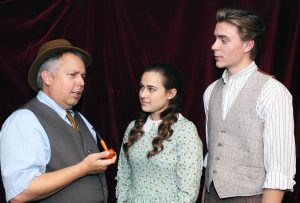SUTTER STREET THEATRE SPOTLIGHTS AN AMERICAN CLASSIC
Review by Gerry Camp

Folsom’s treasure, Sutter Street Theatre, can seemingly do anything, from classic comedies, full-cast Broadway musicals, gross-out farces, and delightful family stories. And sometimes—not often enough, in my humble opinion—they tackle one of the great plays. This they’ve done by bringing us Thornton Wilder’s masterpiece, “Our Town,” playing through July 16.
Most readers will know that the play depicts life in a small town, Grover’s Corners New Hampshire, in the early 1900s. It is presented on a bare stage—here all black—with few props, the actions being mimed by the cast. The play frequently reminds us that it is a play as the main character, known only as the Stage Manager, narrating the story, moving back and forward in the characters’ lives, speaks directly to the audience throughout.
To pull this off demands actors who become the characters, making the audience believe in their lives as the Stage Manager tells their stories, showing life’s universal patterns, their daily lives, love and marriage, and death.
Director Allen Schmeltz has assembled a cast who draws us in completely. James Gilbreath is warm and compassionate, with frequent gentle humor, as the omniscient Stage Manager. The focus of the story is on George Gibbs (Daniel Putman), the son of the local doctor (Keith Casey) and his wife (Jessica Plant), who falls in love with his next-door neighbor, Emily Webb (Lauren Tyner, who steals the show, positively glowing in the heart-breaking part).
The two mothers selflessly but unsentimentally manage cheap lexapro their families. Doc Gibbs is overworked, but has a moving scene with George when he suggests that he be of more help to his mother. Rich Kirlin is perfect as Emily’s father, especially when he has an awkward talk to George on the morning of the wedding, suggesting afterward that there should be a custom where the father of the bride is never alone with the husband-to-be. His scene before the wedding, in which he gives Emily to George, wonderfully conveys a father’s love and feeling of loss.
Maybe I’m being a spoiler when I reveal that the third act is about Emily’s death at twenty-four in childbirth. Joining the other recent dead in the cemetery, she decides, against their advice, to go back and re-live her twelfth birthday. I defy anyone, whether you’ve seen the play before or not, to hold back tears as she learns that nobody realizes the beauty of life while they’re living it. She finally lets go, speaking the play’s most moving lines: “Good-by, Good-by world. Good-bye Grover’s Corners . . . Mama and Papa. Good-by to clocks ticking . . . and Mama’s sunflowers. And food and coffee. And new-ironed dresses and hot baths . . . and sleeping and waking up. Oh, earth, you’re too wonderful for anybody to realize you.”
Many reading this will have seen the play before. Never mind; if you love great theater you owe it to yourself to see this wonderful production of one of the American theater’s greatest works.
